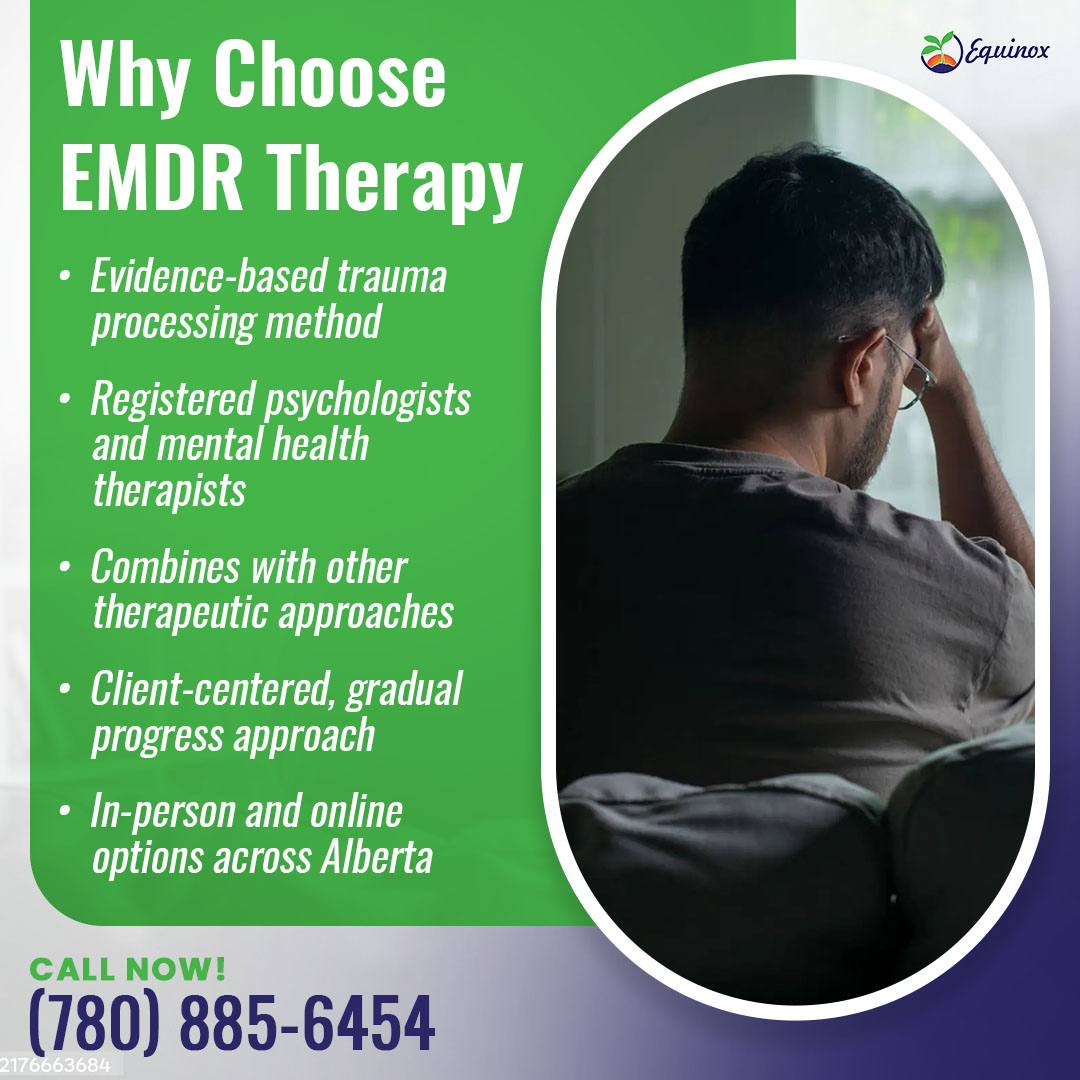Equinox Therapeutic And Consulting Services in Edmonton offers cognitive behavioural therapy (CBT) to help individuals manage emotional and behavioural challenges. If you’re experiencing ongoing changes in mood, anxiety, or difficulty coping with daily life, CBT treatment may provide useful strategies to support your mental health.
Knowing when to seek CBT therapy can be challenging. Here, we’ll highlight seven signs that suggest it might be time to consider professional support. Understanding these indicators can help you decide if CBT therapy is the right option to address persistent concerns and promote better emotional well-being.

7 Signs It May Be Time to Consider CBT Therapy
Recognizing when to seek help is often difficult. These seven signs guide you in reflecting on your current experiences and help you decide if cognitive behavioural therapy (CBT) treatment is a beneficial step forward. Whether you are new to therapy or have tried other approaches, understanding these indicators may clarify if CBT therapy is right for you.
1. Persistent Negative Thoughts Affecting Daily Life
Frequent negative thoughts interfering with your daily activities can be a sign that CBT therapy could help. When negative thinking patterns like self-criticism, pessimism, or catastrophic thinking dominate your mind, they can impact your mood and decision-making. For example, constantly doubting your abilities or expecting the worst can reduce your motivation and make even simple tasks feel overwhelming.
Cognitive behavioural therapy focuses on identifying these harmful thought patterns and gradually shifting them toward more balanced, realistic perspectives. This adjustment often improves emotional well-being and helps restore your enjoyment in everyday activities.
2. Difficulty Managing Anxiety or Excessive Worry
Ongoing anxiety or excessive worry that disrupts your routines may benefit from CBT treatment. Anxiety that feels uncontrollable can prevent you from engaging fully in work, social situations, or even rest. Avoidance of anxiety-triggering situations is common, which can lead to increased isolation or missed opportunities.
If you find yourself feeling tense or fearful most days, CBT therapy may equip you with tools to manage these feelings. Techniques such as gradual exposure to feared situations and relaxation exercises taught during therapy help reduce anxiety’s hold over your life and improve your ability to cope.
3. Struggling with Symptoms of Depression or Low Mood
Prolonged feelings of sadness or loss of interest may indicate a need for cognitive behavioural therapy. Symptoms of depression, including fatigue, changes in appetite, or persistent hopelessness lasting more than two weeks, are common reasons people seek CBT therapy in Edmonton.
Cognitive behavioural therapy may be an effective treatment for mild to moderate depression. It works by helping you explore the connection between your thoughts, feelings, and behaviours. Through this process, you learn to develop healthier routines and coping strategies, which often lead to improvement in mood and daily functioning.
4. Challenges with Anger or Emotional Regulation
Difficulty controlling anger or strong emotions suggests that CBT could provide support. Experiencing frequent anger outbursts or mood swings can strain relationships and create stress in your daily life.
CBT therapy focuses on helping you recognize the early warning signs of emotional escalation and teaches practical skills to manage these feelings before they lead to impulsive or harmful actions. By developing effective coping techniques, you may find it easier to communicate and resolve conflicts more calmly.
5. Repeated Patterns of Unhelpful Behaviours or Reactions
Recurring unhelpful behaviours such as avoidance or procrastination may be addressed through CBT treatment. You might notice that certain habits, like putting off tasks or withdrawing from challenging situations, are creating more stress and limiting your progress toward goals.
CBT helps break down these patterns by increasing your awareness of the thoughts and feelings driving your actions. This awareness allows you to replace old behaviours with healthier choices that better align with your values and objectives.
6. Experiencing Trauma-Related Symptoms
Trauma-related symptoms such as flashbacks, nightmares, or avoidance can signal a role for cognitive behavioural therapy. Trauma often leaves lasting emotional effects that disrupt everyday life.
CBT includes specialized approaches like trauma-focused therapy that assist in safely processing traumatic memories and thoughts. These methods gradually reduce symptom severity and help you regain control over your emotional responses, improving your overall quality of life.
7. Difficulty in Relationships or Communication
Struggles with relationships or communication often improve with CBT therapy. Conflicts or ongoing communication challenges may arise from thought patterns or behaviours that cause misunderstandings or frustration. CBT works by helping you identify these patterns and learn new ways to express your thoughts and emotions clearly. This can lead to stronger, more positive relationships at home, work, or in social settings.
Choosing to pursue CBT therapy in Edmonton can be a meaningful step toward better mental health. The signs above highlight common reasons why people turn to cognitive behavioural therapy for support. If you recognize any of these experiences in your own life, consider discussing CBT treatment options with a qualified professional to explore how this approach may benefit you.
What to Expect During CBT Therapy
Understanding what happens during cognitive behavioural therapy helps you approach treatment with clarity and confidence. Whether you’re considering CBT therapy in Edmonton or exploring your options, knowing the process can ease any concerns and prepare you for active participation.
Session Structure
CBT therapy usually consists of weekly sessions lasting 45 to 60 minutes over a few months. During these sessions, you and your therapist work together closely. The focus is on setting clear, achievable goals based on your specific needs and challenges. Your therapist will help you identify negative thought patterns and behaviours that contribute to your difficulties.
These sessions involve discussing your experiences, practicing new skills, and reviewing progress. The structured approach makes sure that therapy remains focused and productive, maximizing the benefits of CBT treatment.
Homework and Practice
Between sessions, you’ll likely be assigned homework to practice the skills learned in therapy. This practice is a vital part of cognitive behavioural therapy because it helps you apply new strategies in real-life situations. Homework might include keeping thought records, trying relaxation exercises, or experimenting with behavioural changes.
Engaging in these assignments reinforces the techniques discussed during your sessions and helps you make lasting changes outside the therapy room. Regular practice strengthens your ability to manage symptoms and promotes greater self-awareness and resilience over time.
When to Seek Additional Support
Knowing when to consider additional support can help you get the most from your CBT treatment. Cognitive behavioural therapy is often effective on its own, but there are times when combining treatments or adjusting the approach may provide extra benefits.
Combining Treatments
CBT may be combined with medication or other therapies depending on individual needs. Some people find that CBT therapy works well alongside prescribed drugs or other counselling methods.
Healthcare professionals can offer advice on the best combination of treatments tailored to your situation. Working with your therapist and medical providers makes sure that you receive a balanced approach that addresses different aspects of your mental health.
Monitoring Progress
Regular check-ins on your progress help decide if changes to therapy are needed. It is important to communicate openly with your therapist about what is working and what feels challenging.
Monitoring symptoms and progress together allows your therapist to adjust techniques or goals to better suit your evolving needs. This ongoing evaluation helps maintain the effectiveness of cognitive behavioural therapy and supports continuous improvement in your well-being.
How to Find CBT Therapy in Edmonton
Finding the right cognitive behavioural therapy provider in Edmonton is an important step toward receiving effective support. Understanding where and how to access services can make the process smoother.
Registered Providers
Licensed psychologists and therapists offer CBT therapy in Edmonton. These professionals have completed the required training and meet regulatory standards. Verifying the credentials of any provider you consider helps you connect with qualified practitioners who follow established ethical guidelines. Professional registration bodies in Alberta provide directories to help you confirm licensure and specialties in cognitive behavioural therapy.
Delivery Options
CBT treatment can be accessed through in-person or virtual sessions, depending on your preferences and needs. Many therapists now offer online appointments, which can increase convenience and flexibility. Whether you choose face-to-face meetings or virtual therapy, both formats can support effective collaboration and progress. Consider your comfort level, schedule, and accessibility when selecting a delivery method.
The Role of Equinox Therapeutic And Consulting Services
Choosing the right provider is an important step when seeking cognitive behavioural therapy (CBT) in Edmonton, AB. Equinox Therapeutic And Consulting Services offers professional support designed to meet the needs of those considering or currently undergoing CBT therapy.
Professional Support in Edmonton
Equinox Therapeutic And Consulting Services delivers qualified CBT therapy to clients in Edmonton. Our team is made up of licensed psychologists and therapists who follow professional and ethical standards. This makes sure that clients receive care grounded in established practices while working in a safe and respectful environment. Offering local access to CBT treatment allows residents of Edmonton to benefit from timely and reliable mental health support.
Our therapists at Equinox Therapeutic And Consulting Services are trained to work collaboratively with each client. Together, we identify thought patterns and behaviours that may be affecting mental health or well-being. This partnership approach helps clients feel more involved in their care and better prepared to practice CBT techniques outside sessions.

Personalized Care Plans
Therapy at Equinox Therapeutic And Consulting Services is tailored to the individual needs of each client. Rather than a one-size-fits-all approach, our care plans reflect personal goals, experiences, and challenges. This flexibility allows therapists to adjust techniques or focus areas as clients progress through CBT therapy.
By offering a structured but adaptable approach, Equinox Therapeutic And Consulting Services supports clients at every stage of treatment. This might include setting specific goals for managing anxiety, improving mood, or addressing difficult emotions. Regular review and open communication between client and therapist help guide the process and address any concerns along the way.
We also recognize that every person’s experience with mental health is unique. The personalized care plan considers this by providing space for individual strengths and preferences. This can make the therapeutic process more effective and meaningful.
Ready to Take the Next Step in Your Mental Health Journey?
If you’re considering CBT therapy in Edmonton, Equinox Therapeutic And Consulting Services is here to support you. Reach out today at (780) 885-6454 or email [email protected] to learn how CBT can help you overcome challenges and improve your well-being. Start your path to positive change with Equinox Therapeutic and Consulting Services, your trusted partner in mental health care.




